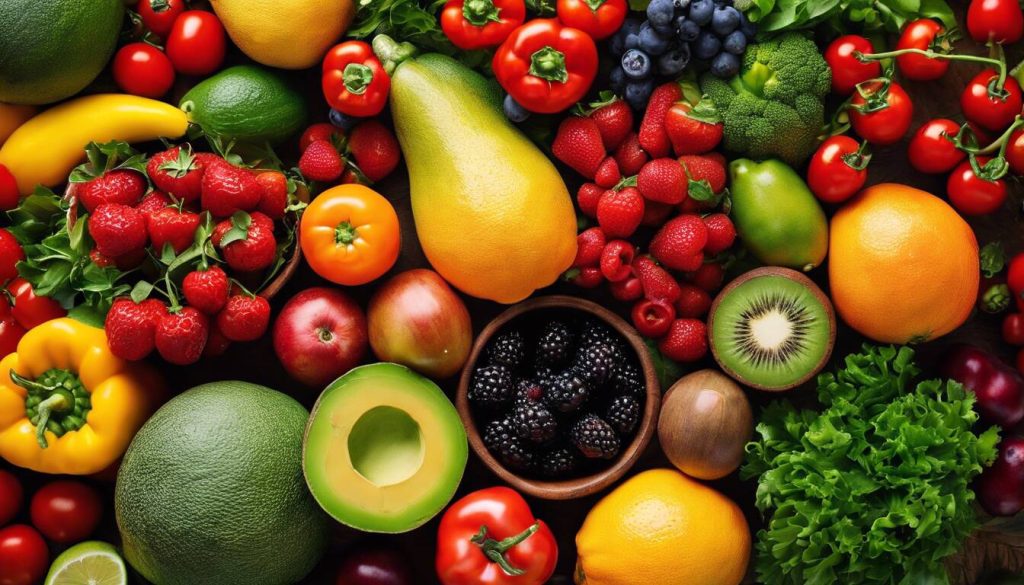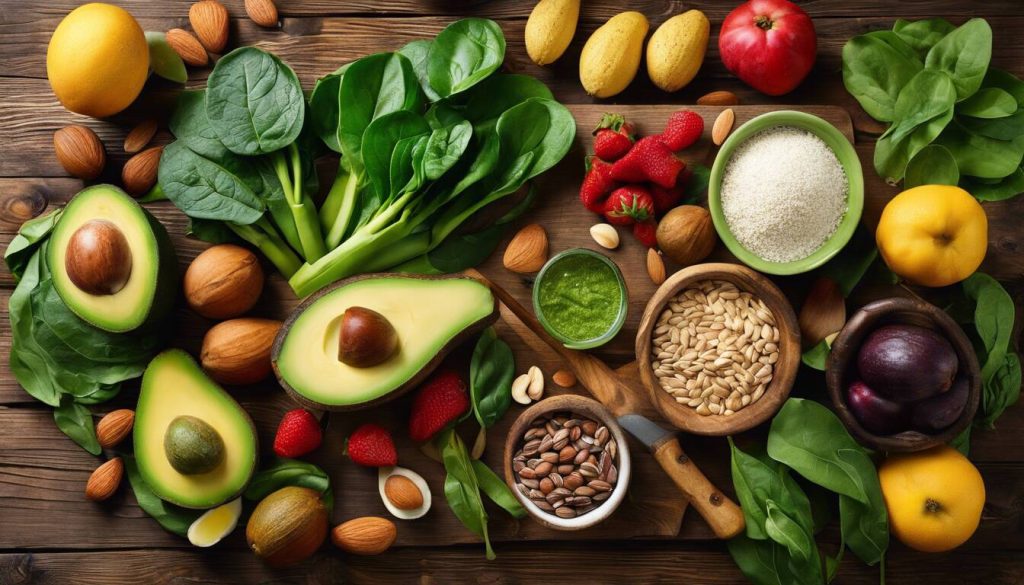Top 10 Nutritional Needs for Aging Bodies: Essential Diet Tips for Seniors
An aging body demands specific vitamins and minerals for optimal health. Foods rich in these life-enhancing nutrients help seniors maintain a robust immune system, energy levels, heart health, and bone integrity. But it's not just about nourishing your body; it's also about enjoying your meals with a vibrant palate of natural flavors. Think juicy oranges packed with vitamin C or a warm bowl of oatmeal sprinkled with crunchy walnuts rich in omega-3 fatty acids. Now, let's delve into the details.
 The top nutritional needs for aging bodies include B12, B6, magnesium, omega-3s, fiber, and vitamin D. These nutrients play crucial roles in supporting nerve function, immune health, sleep, heart health, and bone strength. It's important for seniors to include foods rich in these nutrients in their diet or consider supplements to meet their daily requirements.
The top nutritional needs for aging bodies include B12, B6, magnesium, omega-3s, fiber, and vitamin D. These nutrients play crucial roles in supporting nerve function, immune health, sleep, heart health, and bone strength. It's important for seniors to include foods rich in these nutrients in their diet or consider supplements to meet their daily requirements.
Essential Nutritional Needs for Aging Bodies
As the body ages, its nutritional needs also undergo significant changes. A balanced diet for seniors goes beyond just consuming food; it requires a deliberate focus on obtaining specific nutrients vital for maintaining overall health and well-being. Vitamins and minerals play an instrumental role in supporting various bodily functions and combating age-related health issues.
One such vital nutrient is Vitamin B12, which is crucial for the maintenance of a healthy nervous system and red blood cell formation. Unfortunately, a significant percentage of older adults have difficulty absorbing this vitamin from food sources alone. Therefore, supplementation or intake through fortified foods becomes essential. For example, fortified cereals, non-dairy milk, and nutritional yeast are excellent vegan-friendly sources for Vitamin B12.
Similarly, Vitamin B6 plays a critical role in supporting the central nervous system and immune health. However, adults over 50 often have less efficient absorption of this vitamin, making it necessary to consume foods rich in Vitamin B6 such as liver, fatty fish, chickpeas, or dark leafy greens.
Moving on to another essential mineral, magnesium is recognized for its role in sleep regulation, cognitive function, cardiovascular health, and bone strength. It's alarming to note that many older adults face deficiencies in this essential mineral. To maintain adequate magnesium levels, seniors can turn to dietary sources like nuts, seeds, whole grains, beans, and leafy vegetables.
Omega-3 fatty acids are highly beneficial for brain and heart health. Fatty fish like salmon, flaxseeds, and walnuts are excellent sources of Omega-3s. Incorporating these foods into their diet can significantly benefit aging individuals by enhancing cognitive function and reducing the risk of heart complications.
These foundational nutrients provide a glimpse into the intricate journey of nutrition tailored specifically for aging bodies. Each component plays a distinct and indispensable role in maintaining vitality and warding off age-related health challenges.
With a deeper understanding of the fundamental nutritional needs for seniors under our belts, let's now delve into the specific importance of B-vitamins in senior diets.
The Role of B-Vitamins in Senior Diet
B-vitamins, including B12 and B6, are particularly important for seniors. As we age, our bodies may struggle to absorb these essential nutrients efficiently, which can lead to various health issues.
Vitamin B12 is vital for a healthy nervous system and the production of red blood cells. Without enough B12, seniors may experience symptoms such as lethargy, weakness, and neurological problems. These symptoms are particularly concerning because they can be mistaken for normal signs of aging when, in fact, they may be due to a deficiency in this crucial vitamin. Ensuring an adequate intake of vitamin B12 can help reduce the risk of these issues.
It's quite fascinating how your body uses vitamin B12 to make the outer layer of your nerves. When there's not enough, you might feel weakness or numbness in your hands and feet—a condition called peripheral neuropathy— which can compromise mobility and independence.
Similarly, Vitamin B6 plays a crucial role in maintaining a healthy central nervous system and supporting immune function. However, as adults over 50 often don't absorb it efficiently, they tend to have lower intakes of this vitamin.
The good news is that there are many dietary sources of B-vitamins that seniors can include in their daily diets to meet their nutritional needs without relying on supplements.
For instance, liver is an excellent source of both vitamins B6 and B12. Fatty fish like salmon and trout are also rich in these important vitamins. Furthermore, eggs, whole grains, dark leafy greens like spinach and kale, as well as fortified cereals provide a variety of sources for these crucial nutrients.
By understanding the importance of B-vitamins and incorporating these nutrient-rich foods into their diets, seniors can proactively support their overall health and well-being well into their golden years.
Understanding the significance of essential nutrients opens doors to exploring the powerful impact of one often-overlooked mineral: magnesium.
Magnesium: A Hidden Nutrient Powerhouse

Magnesium often doesn't get the spotlight it deserves, but it plays a crucial role in maintaining good health, especially as we age. This mighty mineral is essential for many bodily functions, ranging from supporting bone health to regulating blood pressure and even aiding cognitive function. In fact, magnesium contributes significantly to over 300 biochemical reactions in the body, making its role even more vital for seniors navigating the aging process.
As we grow older, bone health becomes a major concern. Osteoporosis and bone fractures are more common in older adults, making the need for adequate magnesium intake even more pressing. Magnesium works hand in hand with calcium and vitamin D to help maintain strong bones and reduce the risk of fractures, an important consideration for aging bodies.
Moreover, cognitive function is another area where magnesium plays a crucial role. As we age, maintaining cognitive abilities becomes increasingly important. From memory to learning capacity, magnesium significantly contributes to brain health by supporting nerve function and synaptic plasticity.
Food Sources
Educating seniors about the significance of magnesium can guide them in making healthier food choices that are rich in this vital nutrient. Foods such as nuts, seeds, whole grains, leafy green vegetables, and dairy products are excellent sources of magnesium. By incorporating these foods into their diets, seniors can proactively support their overall well-being and increase their daily magnesium intake.
- Almonds
- Cashews
- Peanuts
- Spinach
- Quinoa
- Avocado
- Black beans
- Yogurt
Encouraging seniors to include these foods in their meals not only promotes magnesium intake but also opens up a world of delicious and nutritious eating options.
Understanding the role of magnesium in promoting bone health and cognitive function illuminates its significance in the overall well-being of seniors. It's clear that by incorporating magnesium-rich foods into their diets, seniors can proactively support their health as they age.
Essential Omega-3s for Brain and Heart Health
As we age, it becomes increasingly important to nourish and protect our brain and heart health. Omega-3 fatty acids act as guardian angels for our brains and hearts, working quietly behind the scenes to keep everything running smoothly. Incorporating omega-3s into your diet isn't a complicated feat. Here's how these remarkable compounds can benefit seniors' cognitive function and overall wellbeing.
Omega-3 fatty acids are renowned for their ability to support brain health. DHA, one of the primary types of omega-3s, is a major structural component in the brain, essential for optimal function and development. It's known to promote the growth of new neurons and reduce inflammation, thereby supporting cognitive function and potentially reducing the risk of age-related cognitive decline. EPA, another type of omega-3, has demonstrated protective properties for heart health, assisting in maintaining healthy blood vessel function and regulating inflammation.
To put this in perspective, think of omega-3s as superheroes swooping in to battle against the forces of mental fog and cardiovascular complications that often become more prevalent with age.
So, where can seniors find these powerful omega-3s? Let's take a look at some of the best dietary sources.
Sources of Omega-3s
- Fatty Fish: Salmon, sardines, mackerel, and trout are stellar sources of omega-3 fatty acids. Including these fish in your weekly meals can significantly boost your omega-3 intake.
- Plant-Based Sources: For seniors following a vegetarian or vegan diet, incorporating flaxseeds, chia seeds, hemp seeds, walnuts, and algae-derived supplements into their meals provides an excellent source of omega-3 fatty acids.
While fatty fish predominantly provide DHA and EPA directly, plant-based sources such as flaxseeds and chia seeds contain alpha-linolenic acid (ALA), a precursor to DHA and EPA. This conversion process in the body is limited but still contributes to overall omega-3 levels.
Ensuring an adequate intake of these nutritious sources rich in omega-3 fatty acids can significantly contribute to supporting optimal brain function and heart health in seniors.
In the quest for bolstering senior nutrition, let's now delve into the vital role of fiber in promoting holistic health for aging individuals.
The Importance of Fiber in Senior Diet
As we age, our bodies undergo several natural changes. One such change is a slowdown in bowel function, which can lead to constipation, a common issue for many seniors. This is where fiber comes to the rescue! It acts like a gentle broom that sweeps away waste and toxins from the body. By aiding digestion and preventing constipation, fiber ensures that eliminations occur regularly and comfortably, playing a crucial role in maintaining seniors' health.
Dietary fiber also offers a helping hand in weight management—an aspect that becomes increasingly important as we grow older. Consuming fiber-rich foods can help seniors feel full for longer periods, reducing the need for unnecessary snacking and overeating. This contributes to a balanced diet and healthy weight maintenance, lowering the risk of heart disease and diabetes. Therefore, it's not just about feeling satiated; fiber effectively manages weight, aligning with the dietary needs of aging bodies.
Consider incorporating fiber-rich meals into your daily routine—perhaps starting your day with a hearty bowl of bran cereal or indulging in a refreshing fruit salad as an afternoon snack. These small changes can make a substantial difference in your overall well-being.
Dietary Fiber Sources
The good news is that high-fiber foods are easily accessible and delicious! From bran cereals to legumes, fruits to nuts, seeds to vegetables—there's an abundance of options to choose from. Nudging seniors toward these key dietary sources of fiber ensures an enriching and varied diet. Educating seniors about the importance of including these foods not only improves their daily nutritional intake but also brings about positive health outcomes.
Remember: Eating whole fruits instead of drinking fruit juice can increase fiber intake. Additionally, consuming whole-grain bread, brown rice, and whole-wheat pasta over their refined counterparts can significantly boost your fiber consumption.
With this newfound understanding of the significance of fiber in senior diets, making conscious choices toward incorporating high-fiber foods can substantially enhance overall well-being and vitality in later years.
The Sunshine Vitamin: Understanding Vitamin D
As we age, our bodies require different nutrients to maintain optimal health. One of the most essential nutrients for seniors is Vitamin D, often referred to as the "sunshine vitamin." This crucial vitamin plays various roles in our body, including aiding in calcium absorption, supporting bone health, and maintaining muscle function.
Importance of Vitamin D
Without adequate levels of Vitamin D, seniors are at an increased risk of developing weak and brittle bones, making them more susceptible to fractures and falls. Moreover, research suggests that maintaining sufficient levels of Vitamin D can contribute to reducing the risk of developing certain chronic conditions and diseases associated with aging.
Sources of Vitamin D
Seniors might wonder where this important nutrient can be obtained from. The primary method for the body to produce Vitamin D is through exposure to sunlight. However, due to factors such as limited outdoor activity or geographical location, some seniors may find it challenging to get enough sunlight to meet their Vitamin D needs. In such cases, dietary sources play a significant role in ensuring an adequate intake of this essential nutrient.
Dietary sources of Vitamin D include fortified dairy products such as milk, cheese, and yogurt. Additionally, fatty fish like salmon, mackerel, and tuna are rich natural sources of Vitamin D.
Strategies for Seniors
For many seniors, especially those with limited mobility or living in areas with minimal sunlight, incorporating foods rich in Vitamin D into their daily diet becomes crucial. Moreover, consulting with a healthcare provider about potential Vitamin D supplements can be beneficial in fulfilling any deficiencies. These strategies help ensure that seniors receive the necessary amount of Vitamin D to support their overall health and well-being.
By understanding the significance of Vitamin D and implementing these key strategies for obtaining it efficiently, seniors can take proactive steps towards maintaining their health and vitality as they age.
Nutritious Foods to Support Healthy Aging
Eating well can make a big difference as you grow older. A balanced diet with lots of variety not only meets your body's nutritional needs but also helps stave off health problems that come with aging. Here are some key food categories and examples for seniors' diets.
Fruits and Vegetables
Let's take a trip to the produce aisle! Fruits and vegetables are a treasure trove of vitamins, minerals, fiber, and antioxidants. They can assist in maintaining healthy blood pressure, cognitive function, and digestive health. For instance, colorful fruits like berries, kiwi, and oranges bring vitamin C and potassium to the table. Spinach, kale, sweet potatoes, and bell peppers provide crucial nutrients such as vitamin K, beta-carotene, and folate. So make sure to fill your plate with a variety of colors from Mother Nature.
Lean Proteins
Lean proteins play an important role in preserving muscle mass and supporting immune function. Opt for lean cuts of meat like chicken or turkey, fish rich in omega-3 fatty acids (think salmon or trout), eggs - which are a versatile superfood, and plant-based sources like tofu or legumes can provide an array of amino acids without the saturated fat present in some animal proteins.
Whole Grains
Whole grains are rich in fiber, B vitamins, and minerals like iron and magnesium while serving as an effective tool for weight management and improving gut health. Examples include oats, quinoa, brown rice, whole grain bread, and pasta. They're hearty and versatile choices that can keep you feeling full and energized.
Balanced Meals
It's not just about individual foods; it's about how they come together on your plate. Aim for balanced meals that combine these key food groups. For example, a simple yet nourishing meal could include grilled salmon (lean protein) with a side of steamed broccoli (vegetable) and quinoa (whole grain) drizzled with olive oil. It's both healthy and delicious when prepared with love!
Remember to consider your personal dietary preferences or any medical conditions when planning your meals.
By incorporating this variety of fruits, vegetables, lean proteins, and whole grains into their diet, seniors can ensure they receive all the essential nutrients necessary to support healthy aging—effortlessly turning each meal into a celebration of flavor, balance, and nutrition.
As we continue along the path of maintaining optimum nutrition for aging bodies, it becomes increasingly important to address potential deficiencies that may arise despite our best efforts in dietary selection.
Addressing Deficiencies: When to Consider Supplements
As we age, our bodies may not absorb nutrients as effectively as they once did, leading to potential deficiencies. While it’s best to get nutrients from a balanced diet, sometimes this isn't enough. There are instances where certain vitamins and minerals aren't fully absorbed by the body, leaving a gap that needs filling. This can be due to a variety of factors such as a decline in digestive function or reduced intake of specific nutrients due to dietary restrictions.
One example is vitamin B12. Since some older adults may have difficulty absorbing B12 from food due to decreased stomach acid production, it might be necessary for them to take a supplement. Another case could be with Vitamin D, where seniors who may not get enough sunlight exposure may benefit from supplementation.
It's crucial to recognize when supplements are needed and how they can help alleviate potential health issues. However, before incorporating any new supplements into your diet, consulting with a healthcare professional is paramount. They can assess your individual needs and provide personalized recommendations based on your overall health status and any existing medical conditions.
For instance, if you're experiencing fatigue and weakness, it may be due to an iron deficiency. Your doctor can run tests to confirm this and recommend appropriate supplements.
Another way to address nutritional deficiencies would be through fortified foods or drinks. These are regular food items that have extra nutrients added to them – like calcium-fortified juices or cereals with added fiber. Depending on the specific nutrient deficiency, these kinds of products may offer an alternative solution while providing additional benefits.
Remember, while supplements can fill nutritional gaps, they shouldn’t substitute for a balanced diet. It's essential to approach supplementation mindfully and in consultation with healthcare professionals who can guide you through the best course of action for your individual needs.
Ensuring optimal nutrition for aging bodies requires a combination of dietary adjustments and, at times, strategic use of supplements under professional guidance. By merging both approaches thoughtfully, seniors can maintain their well-being and vitality.
